Annual reports / 2021 Annual Letter
2021 Annual letter
February 2021
Dear Colleague:
One year ago today, based on analysis by experts from around the world at Resolve to Save Lives, we and others wrote, sadly, that a Covid pandemic was inevitable.
In this past year, our team helped the world better understand and more effectively respond to the Covid pandemic that has, tragically, taken so many lives. Covid revealed stark and unacceptable gaps in our public health and primary care systems, and also validated Resolve’s approach to help close these gaps.
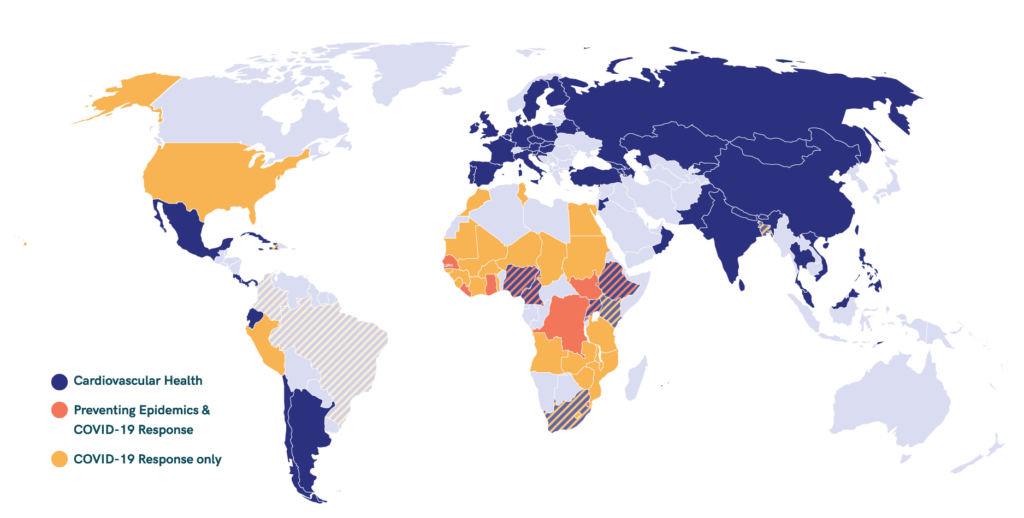
None of this would be possible without our colleagues at Vital Strategies and the support of our donors. Bloomberg Philanthropies, the Gates Foundation, Gates Philanthropy Partners, which is funded with support from the Chan Zuckerberg Foundation, the CDC Foundation, and the Stavros Niarchos Foundation all provided fast, flexible, and generous support.
Here are nine ways we’ve worked with partners to meet our goal of improving health using an approach centered on simplicity, speed, and scale
1. Science as a verb
In “The Martian,” Matt Damon plays a botanist stranded on Mars. He realizes that to get back home, he’s going to have to “science the s— out of” the problem. Resolve’s team of epidemiologists and public health specialists have been learning every day. As the evidence has changed, our approach has not – always base our recommendations on the best available science.
- Governments across the United States and throughout the world adopted many of our evidence-based strategies to control the pandemic, including:
- Using an adaptive response to the pandemic, which we released more than a year ago and updated regularly as more information became available. The concept, and most of the details on phased reopening guidance, were adopted by the White House, although unfortunately the strategy wasn’t followed.
- Best practice reports on the impact of public health and social measures led to wider adoption of these measures.
- Boxing in the virus to prevent explosive spread and reopen society as soon and as safely as possible.
- Establishing alert level systems to provide a framework to support clear decision-making, improve accountability, and better communicate with the public. Many states and countries adopt this tool, and we partnered with the New York Times to make a consistent system across the U.S. available to all.
- Reopening schools while prioritizing the safety of students and their families, teachers and staff, and the entire community.
- Communicating the importance of wearing masks and implementing mask mandates to prevent viral transmission and slow community spread.
- Measuring and reporting essential Covid indicators.
- Implementing, along with our Vital Strategies colleagues, rapid mortality surveillance to better track the pandemic.
Our Prevent Epidemics website had more than a million visits in the past year; our work continues to set the agenda for strong public health systems during and beyond the Covid response.
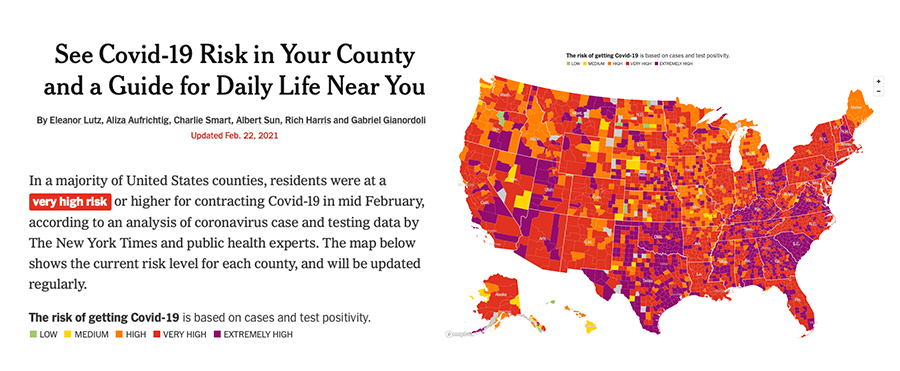
2. Funding to stop outbreaks – provided quickly.
Before and during the Covid pandemic, Resolve provided rapid response funds to more than two dozen countries in Africa and elsewhere. A systematic analysis in Nigeria found that time to outbreak response decreased from six to two days after the fund was implemented. Stopping an outbreak in a few days can cost a tiny fraction of what it would cost if allowed to spread for weeks or months. In Nigeria and other countries, these funds are now replenished by government funds.
We established “acceleration teams” of epidemiologists, veterinarians, evaluation experts, and other specialists that helped several African countries use national resources and World Bank funding better. In Uganda, preliminary data suggests that, with our support, the government resolved all major weaknesses in epidemic preparedness; it would be the first country on the continent outside of North Africa to have done so. In Nigeria and Liberia, these teams helped more than double World Bank disbursements within a year.
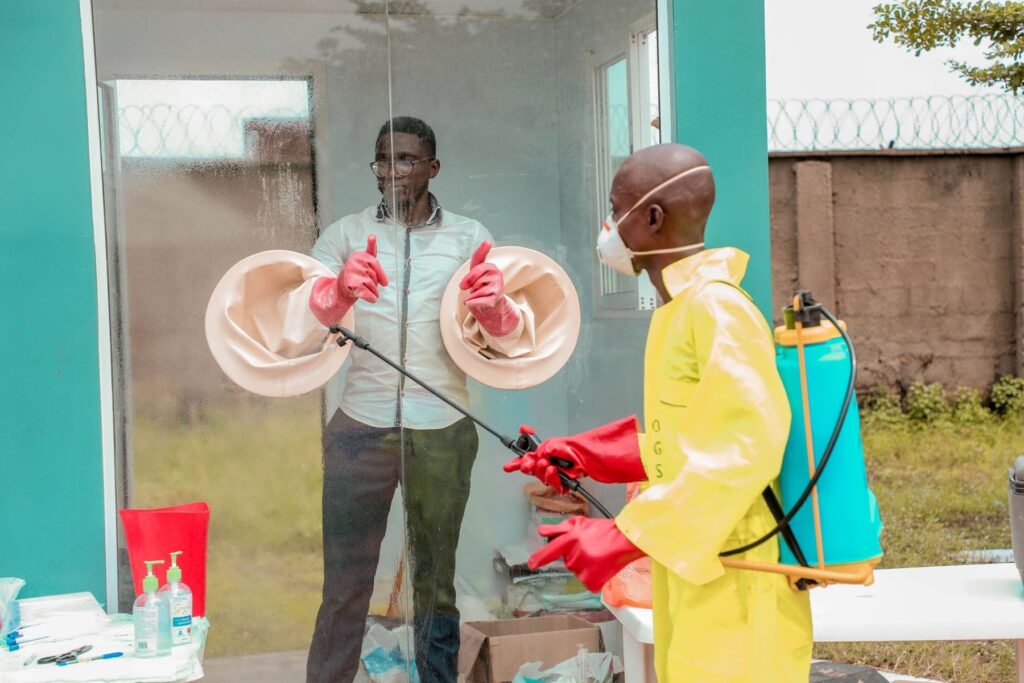
3. Working alongside partners to build capacity
Collaboration is essential to protect health sustainably. In 2019, our training course, Program Management for Epidemic Preparedness, graduated 25 mid-level managers representing seven countries in Africa. This investment paid off during the Covid pandemic as these individuals and their teams were able to rapidly improve detection and response. Our second training program, planned before and conducted during the pandemic, was held in the Democratic Republic of Congo and helped to align ministry officials and World Bank staff to enable the timely and effective use of $150 million in World Bank funds for epidemic preparedness.
Our global legal and advocacy teams issued guidance and provided detailed legal consultation to equip cities and countries to rapidly review existing legal frameworks, fill gaps, and ensure that public health and social measures to address Covid were in accordance with legal and ethical best practices.
With input from health departments in the US, we leveraged technology, applying lessons learned from our successful Simple app. Our digital team developed tools to improve case management and contact tracing for Covid. We supported the Africa Centres for Disease Control and Prevention to improve laboratory systems in Africa, launch a dashboard tracking the pandemic, and more.
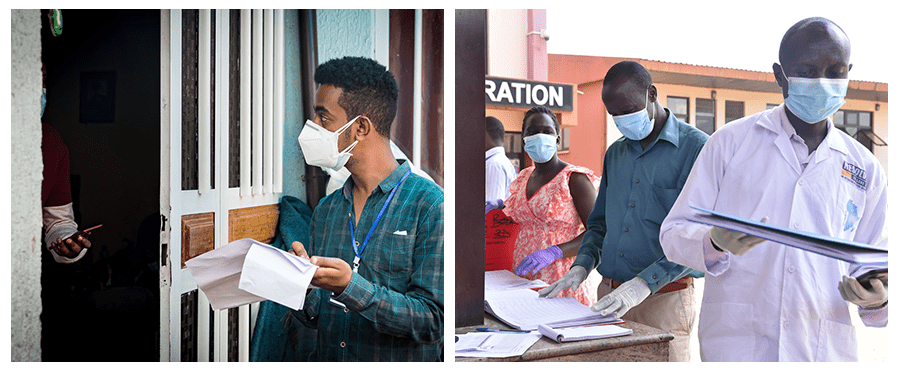
4. Stopping covid in the U.S. – especially among vulnerable populations.
We started work in the U.S., creating a US Covid Response team. Our staff worked with public health departments across the country to strengthen prevention strategies, testing, isolation and quarantine, contact tracing, vaccination, and community engagement, all with a focus on equity. We also joined with other national public health organizations to advocate for improved funding and policies to address this pandemic and prevent the next.
Recognizing the importance of reaching Black communities through faith leaders, we supported launch of the Black Clergy Choose Healthy Life Action Plan, a multi-city initiative to raise awareness of Covid, test those at highest risk, provide services for contact tracing, isolation, and quarantine, promote access to vaccination, and strengthen the infrastructure within the Black church network to end health disparities.
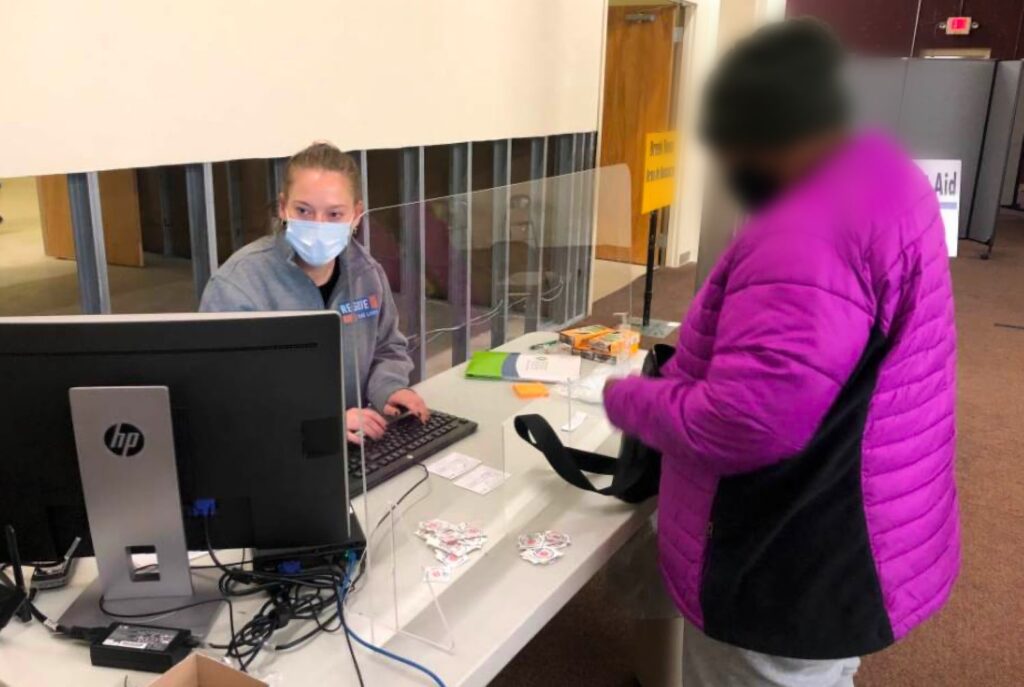
5. Honoring our health care heroes by protecting them.
As soon as the pandemic hit, we established on-the-ground health care worker training focused on infection prevention and control. Our training was used by more than two dozen partners to train more than 35,000 staff in 7,000 facilities throughout Africa, facilitating safe screening of more than 4 million patients. Learning from this experience, in January 2021, we led a coalition of 17 organizations to publish a report that highlights the risks health care workers face every day and provides recommendations to protect them – and their patients – by making health facilities safer.
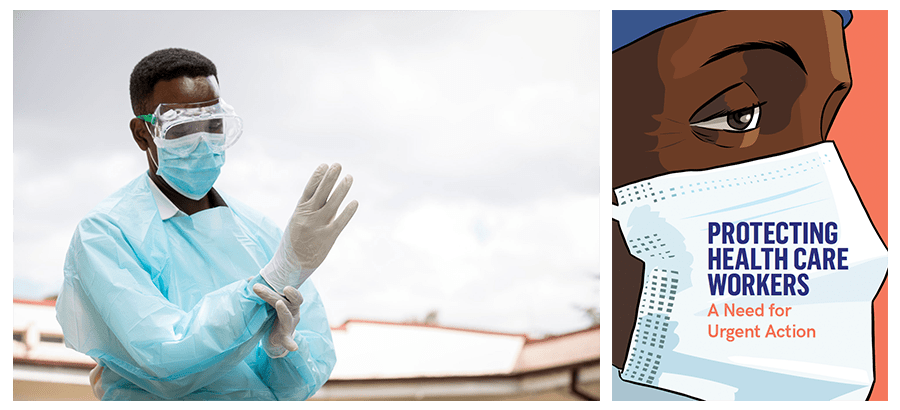
6. Basing action on evidence.
We spearheaded development of the Partnership for Evidence-Based Response to Covid, a public-private partnership that supports evidence-based measures to reduce the impact of the pandemic on African Union Member States. The partnership collected and analyzed social, economic, epidemiological, population movement, and security data from 20 countries to help determine the impact of public health and social measures.Our report revealed that while effective in reducing disease spread, the Covid control measures quickly implemented by many member states caused severe secondary impacts. Many communities across Africa reported difficulties accessing critical health services due to the extra burden placed on health systems, interruptions to medical supply chains, and restrictions on movement. People also reported being hesitant to seek care due to actual or perceived risk of transmission or inability to pay for care. This data led to policy changes to better balance control of Covid with protecting communities’ social and economic stability.
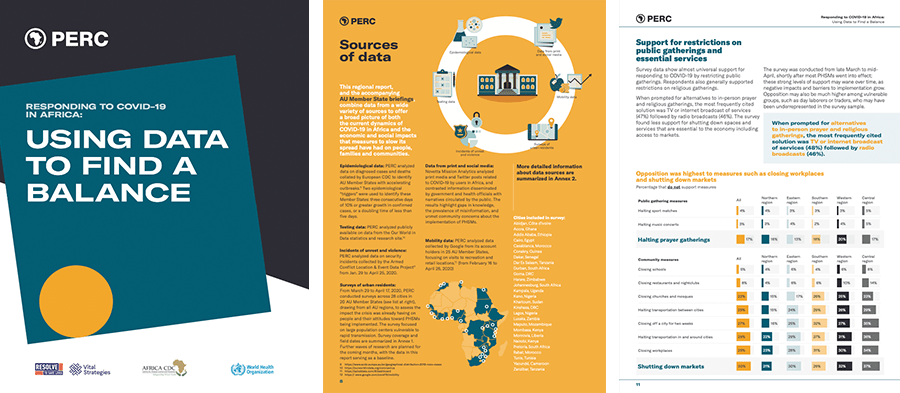
7. Primary care is primary.
A key lesson from the Covid pandemic is the need for primary care to be at the center of health systems. Non-communicable diseases continue to be the leading global causes of death, and we must continue life-saving preventive care and treatment during the pandemic; in addition to saving lives today, this will promote individual and community resilience against Covid and future health threats.
Resolve to Save Lives’ cardiovascular health team developed guidance on how health systems can maintain life-saving hypertension care, leverage technology in the context of the Covid pandemic, and implement a comprehensive hypertension care program, tools that have been used in dozens of countries. The team produced fact sheets for patients and primary health care providers on how to reduce the risk of Covid transmission; these were translated into more than 15 languages and disseminated by partners around the world.
In countries across the globe, we also promoted simple but innovative patient-centered approaches to increase patient and provider safety during the pandemic:
- Dispensing 3-6 months of medication for patients with stable hypertension.
- Delivering medications directly to patients.
- Increasing use of telemedicine and other virtual technologies including phone, email, and text messaging.
- Treating and monitoring at convenient locations in the community.
More than 1.5 million individuals have received hypertension care and treatment through programs supported by Resolve’s work. New programs were launched in the Philippines, Ethiopia, Mexico, and Nigeria.
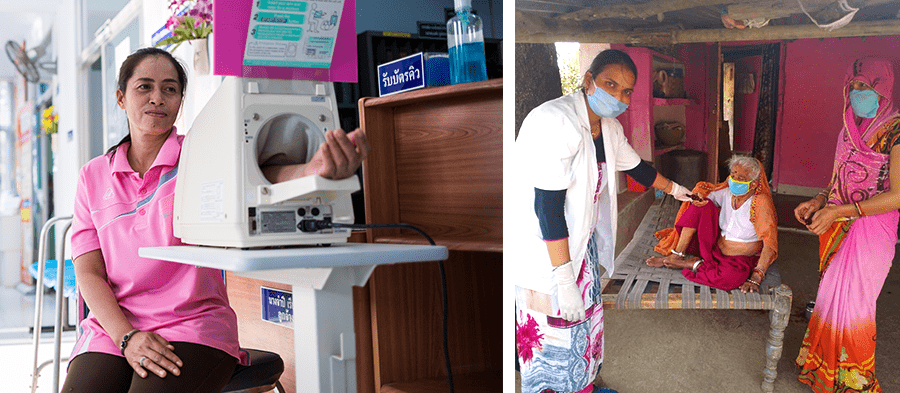
8. Using policy to save lives.
We continued to advance policy actions to address cardiovascular disease. Global momentum to eliminate trans fat is growing, including an earlier win in Thailand and recent bold action by India to eliminate trans fat by 2022, a stunning victory for healthy nutrition. Turkey and Paraguay also acted to eliminate trans fat, and Nigeria, Bangladesh and the Philippines are now poised to do so. We partnered with the World Health Organization to launch the second annual progress report for the REPLACE initiative to eliminate artificial trans fat. Although 58 countries have introduced laws that will protect 3.2 billion people from trans fat by the end of 2021, more than 100 countries still need to take action to remove this toxic substance from their food supply.
Our team identified seven priority interventions to reduce sodium intake and save lives, including front-of-pack warnings, restrictions on food marketing to children, and taxes on high-sodium foods. We joined WHO to release a policy action framework on public procurement of healthy food, and helped launch four new projects to develop and implement policies on healthy public food procurement in Uganda, Togo, Nepal, and the Philippines. Our partners in Viet Nam and Ethiopia debuted each country’s first national mass media campaign designed to encourage people to reduce their salt intake. We are sponsoring studies in China, India, Ethiopia and Thailand to determine the most effective front-of-pack label in order to provide evidence for policy change.

9. Spread truth.
The Covid pandemic was accompanied by an epidemic of competing and often inaccurate information spreading rapidly throughout the world. Our communications team filled a need for real-time, credible public health information by producing high-quality, evidence-based communications materials for diverse audiences.
We produced more than 400 communications products in 25 languages and supported 22 countries and 44 cities with mass media campaigns and the development of effective risk communications strategies. We shared our public health expertise in thousands of media interviews and dozens of peer-reviewed medical journal articles and op-ed pieces in leading global media outlets, and we were mentioned more than 25,000 times in news stories around the world.
Our “3 Ws” strategy – Wear a mask, Watch your distance, and Wash your hands – was disseminated by media outlets and partners worldwide and continues to be at the core of strategies to prevent disease transmission.
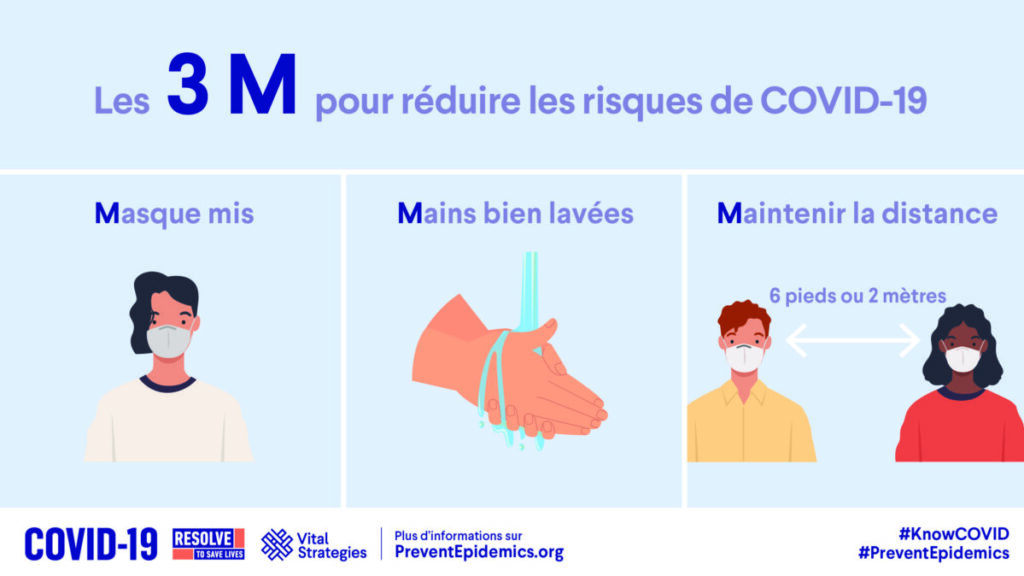
This moment brings a once-in-a-century opportunity. it’s now or never.
Working together, we will take a giant step toward being able to find, stop, and prevent health threats faster in every country through public health systems that are understood, supported, and celebrated. This starts with expanding equitable access to vaccines to end the Covid pandemic. It’s both ethically unacceptable and epidemiologically perilous that so much of the world is so far from having vaccine access. Uncontrolled spread anywhere threatens to prolong the pandemic everywhere, and we must scale up not only vaccine access but also vaccine manufacturing capacity in low- and middle-income countries. Beyond Covid, we need a public health renaissance so health threats are detected rapidly by accurate and sensitive tracking systems and laboratory networks, stopped quickly by trained epidemiologists and rapid response teams, and prevented wherever possible, including through ongoing vaccination programs and action to make our environment safer.
Working together, we will partner with governments, health systems, and civil society to make policy and program changes centered on improving equity that increase our personal and community resilience and promote heart and brain health so we live longer, healthier, more productive lives. We will help more countries follow India’s trans fat elimination best practices. We will accelerate progress toward Resolve’s goal of preventing 100 million deaths from cardiovascular disease in 30 years and achieve the Sustainable Development Goal of a one third reduction in today’s leading killers by 2030.
Working together, we will make primary care central to our health systems – building teams, supporting patients, and holding all accountable for achieving the health that health care can deliver and for ending health disparities. By establishing accessible, responsive care systems, we’ll find health problems when they emerge, prevent illness, injury, disability, and premature death, and accelerate a virtuous cycle toward healthier and more productive societies.
We resolve to work with partners to strengthen the hands of public health and primary care around the world so that, together, we build this healthier future.
Thank you for joining us.
Dr. Tom Frieden
President and CEO
Resolve to Save Lives